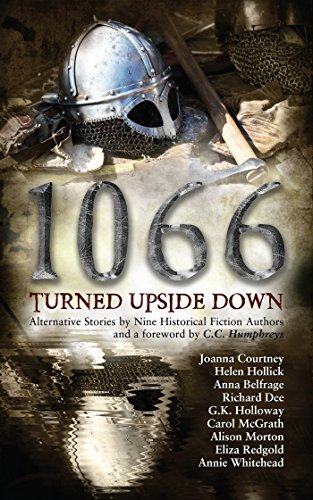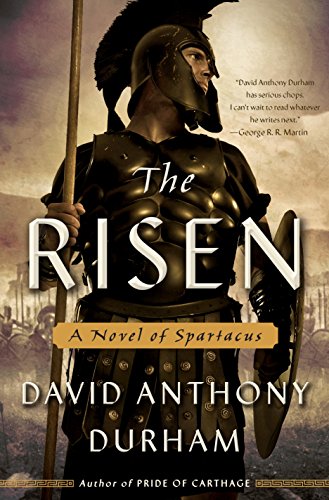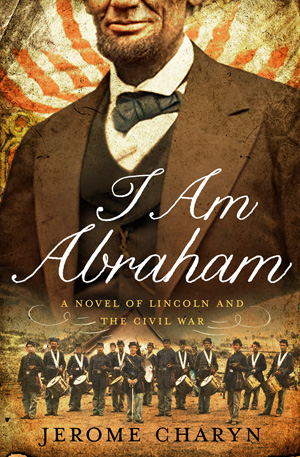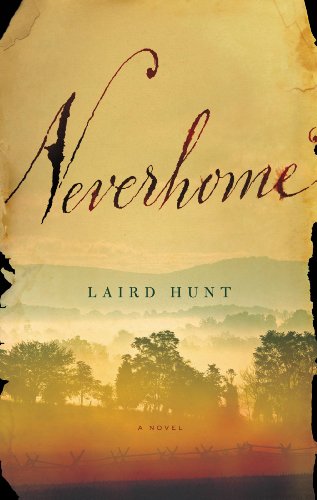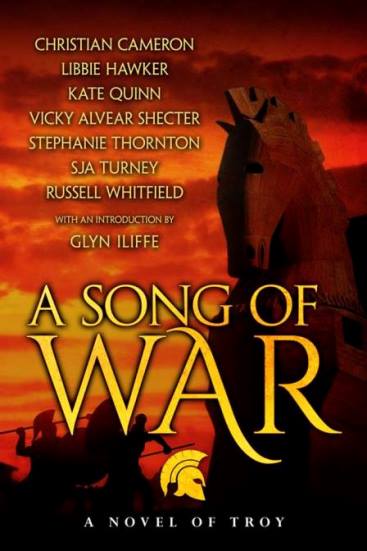
Publication Date: October 18, 2016
Knight Media, LLC
eBook & Paperback; 483 Pages
Genre: Historical Fiction/Ancient History/Anthology

Troy: city of gold, gatekeeper of the east, haven of the god-born and the lucky, a city destined to last a thousand years. But the Fates have other plans—the Fates, and a woman named Helen. In the shadow of Troy's gates, all must be reborn in the greatest war of the ancient world: slaves and queens, heroes and cowards, seers and kings . . . and these are their stories.
A young princess and an embittered prince join forces to prevent a fatal elopement.
A tormented seeress challenges the gods themselves to save her city from the impending disaster.
A tragedy-haunted king battles private demons and envious rivals as the siege grinds on.
A captured slave girl seizes the reins of her future as two mighty heroes meet in an epic duel.
A grizzled archer and a desperate Amazon risk their lives to avenge their dead.
A trickster conceives the greatest trick of all.
A goddess' son battles to save the spirit of Troy even as the walls are breached in fire and blood.
Seven authors bring to life the epic tale of the Trojan War: its heroes, its villains, its survivors, its dead. Who will lie forgotten in the embers, and who will rise to shape the bloody dawn of a new age?
Review
This is probably the most realistic portrayal of Paris and Helen I've seen yet. The trouble I always had with the Trojan War epic is the idea that two protagonists would make such a spectacularly selfish and reckless decision which they likely knew would result in war. It's normally portrayed as this utterly romantic idea, that they were just so in love, they had no choice. But I've always thought it was selfish and irresponsible, and that's finally how the H Team decided to portray it too. Paris is doing the bidding of his war mongering father by deliberately sparking war, while Helen is seeking the freedom and influence that Trojans would give her, both without regard to the innocent lives it will take. So I really appreciated the more realistic approach in moving away from Paris and Helen as the romantic protagonists and instead focusing on other, more likable characters.
I felt like this novel, in comparison to the previous ones by the H Team, was more at the heart of the major players in the event. The previous stories were frequently told from the points of view of a lot of nameless fictional characters, while this one was told from the points of view of characters like Helenus, Cassandra, Andromache, Agamemnon, etc. That is not a criticism of either this novel or the previous ones, just an observation. Like the previous novels though, this one also tells both side of the story, and we get to see protagonists and antagonists on both sides of the war.
Although the authors involved in the H Team projects vary by the book, the quality of writing never does. This is once again a very well written and well put together story of an epic tragedy in history/legend.
About the Authors
CHRISTIAN CAMERON was born in Pittsburgh, Pennsylvania in 1962. He grew up in Rockport, Massachusetts, Iowa City, Iowa,Christian Cameron and Rochester, New York, where he attended McQuaid Jesuit High School and later graduated from the University of Rochester with a degree in history.
After the longest undergraduate degree on record (1980-87), he joined the United States Navy, where he served as an intelligence officer and as a backseater in S-3 Vikings in the First Gulf War, in Somalia, and elsewhere. After a dozen years of service, he became a full time writer in 2000. He lives in Toronto (that’s Ontario, in Canada) with his wife Sarah and their daughter Beatrice, currently age four. And a half.
LIBBIE HAWKER was born in Rexburg, Idaho and divided her childhood between Eastern Idaho's rural environs and the greater Seattle area. She presently lives in Seattle, but has also been a resident of Salt Lake City, Utah; Bellingham, Washington; and Tacoma, Washington. She loves to write about character and place, and is inspired by the bleak natural beauty of the Rocky Mountain region and by the fascinating history of the Puget Sound.
After three years of trying to break into the publishing industry with her various books under two different pen names, Libbie finally turned her back on the mainstream publishing industry and embraced independent publishing. She now writes her self-published fiction full-time, and enjoys the fact that the writing career she always dreamed of having is fully under her own control.
KATE QUINN is a native of southern California. She attended Boston University, where she earned a Bachelor's and Master's degree in Classical Voice. A lifelong history buff, she has written four novels in the Empress of Rome Saga, and two books in the Italian Renaissance detailing the early years of the infamous Borgia clan. All have been translated into multiple languages.
Kate has succumbed to the blogging bug, and keeps a blog filled with trivia, pet peeves, and interesting facts about historical fiction. She and her husband now live in Maryland with two black dogs named Caesar and Calpurnia, and her interests include opera, action movies, cooking, and the Boston Red Sox.
VICKY ALVEAR SHECTER is the author of the young adult novel, Cleopatra's Moon (Arthur A. Levine Books/Scholastic, 2011), based on the life of Cleopatra's only daughter. She is also the author of two award-winning biographies for kids on Alexander the Great and Cleopatra. She is a docent at the Michael C. Carlos Museum of Antiquities at Emory University in Atlanta. The LA Times calls Cleopatra's Moon, "magical" and "impressive." Publisher's Weekly said it was "fascinating" and "highly memorable." The Wall Street Journal called it "absorbing."
STEPHANIE THORNTON is a writer and history teacher who has been obsessed with infamous women from ancient history since she was twelve. She lives with her husband and daughter in Alaska, where she is at work on her next novel.
Her novels, The Secret History: A Novel of Empress Theodora, Daughter of the Gods: A Novel of Ancient Egypt, The Tiger Queens: The Women of Genghis Khan, and The Conqueror's Wife: A Novel of Alexander the Great, tell the stories of history's forgotten women.
SJA TURNEY lives with his wife, son and daughter, and two (close approximations of) dogs in rural North Yorkshire.
Marius' Mules was his first full length novel. Being a fan of Roman history, SJA decided to combine his love of writing and love of the classical world. Marius' Mules was followed two years later by Interregnum - an attempt to create a new fantasy story still with a heavy flavour of Rome.
These have been followed by numerous sequels, with three books in the fantasy 'Tales of the Empire' series and five in the bestselling 'Marius' Mules' one. 2013 has seen the first book in a 15th century trilogy - 'The Thief's Tale' - and will also witness several side projects seeing the light of day.
RUSSELL WHITFIELD was born in Shepherds Bush in 1971. An only child, he was raised in Hounslow, West London, but has since escaped to Ham in Surrey.
Gladiatrix was Russ's first novel, published in 2008 by Myrmidon Books. The sequel, Roma Victrix, continues the adventures Lysandra, the Spartan gladiatrix, and a third book, Imperatrix, sees Lysandra stepping out of the arena and onto the field of battle.
Blog Tour Schedule
Saturday, October 15
Review at
Just One More Chapter
Review at
Flashlight Commentary
Sunday, October 16
Review at
Ageless Pages Reviews
Monday, October 17
Review at
Leeanna.me
Tuesday, October 18
Review at
A Book Drunkard
Wednesday, October 19
Excerpt at
A Literary Vacation
Thursday, October 20
Review at
Peeking Between the Pages
Friday, October 21
Review & Excerpt at
The Silver Dagger Scriptorium
Saturday, October 22
Review at
100 Pages a Day
Monday, October 24
Review at
Unabridged Chick
Tuesday, October 25
Interview at
Unabridged Chick
Wednesday, October 26
Review at
The Maiden's Court
Friday, October 28
Review at
History From a Woman's Perspective
Monday, October 31
Review & Excerpt at
Book Lovers Paradise
Tuesday, November 1
Review at
Oh, for the Hook of a Book!
Wednesday, November 2
Interview at
Oh, for the Hook of a Book!
Thursday, November 3
Review at
Jorie Loves a Story
Monday, November 7
Review at
A Bookish Affair
Tuesday, November 8
Interview at
Let Them Read Books
Wednesday, November 9
Review at
Historical Readings & Reviews
Friday, November 11
Review at
Broken Teepee
Spotlight at
The Book Tree
Saturday, November 12
Excerpt at
The Reading Queen
Review at
The True Book Addict
Giveaway
To win a paperback copy of A Song of War: A Novel of Troy by the H Team, please enter via the Gleam form below.
Rules
– Giveaway ends at 11:59pm EST on November 12th. You must be 18 or older to enter.
– Giveaway is open to US & Canada residents only.
– Only one entry per household.
– All giveaway entrants agree to be honest and not cheat the systems; any suspect of fraud is decided upon by blog/site owner and the sponsor, and entrants may be disqualified at our discretion.
– Winner has 48 hours to claim prize or new winner is chosen.
A Song of War









